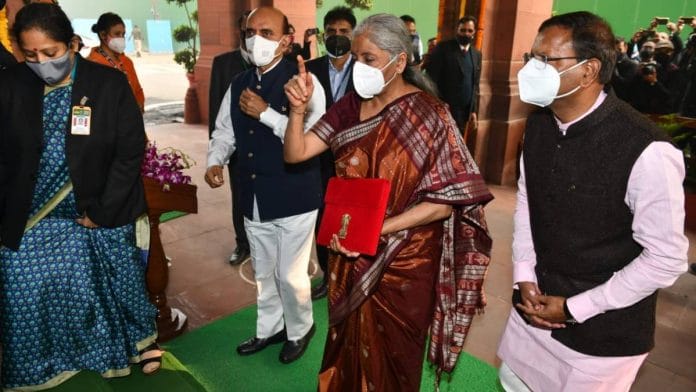New Delhi: Finance minister Nirmala Sitharaman in her Budget speech Tuesday focussed on digital health and mental health — the latter in the context of the high mental health cost of the ongoing Covid-19 pandemic.
Overall, the 2022-23 Budget estimate for health stands at Rs 86,606 crore, up 16 per cent over Rs 74,602 crore in 2021-222 — a 16 per cent hike. The revised estimate for the current financial year is Rs 85,915 crore.
“The pandemic has accentuated mental health problems in people of all ages. To better the access to mental health counselling and care services, a national telemental health programme will be launched,” Sitharaman said in her speech.
“Telemental health“ refers to the use of telecommunications or videoconferencing technology to provide mental health services.
“This will include a network of 23 telemental health centres of excellence with NIMHANS (National Institute of Mental Health and Neurosciences, Bengaluru) being the nodal centre, and the International Institute of Information Technology, Bengaluru, providing technology support,” she added.
A 2019 paper published in The Lancet Psychiatry, which looked at the mental health burden in India, estimated that 197 million (19.7 crore) people — roughly one in seven Indians — suffered from mental disorders of varying severity in 2017. These included depression, anxiety disorders, schizophrenia, bipolar disorders, idiopathic developmental intellectual disability, conduct disorders, and autism.
Sitharaman also announced the launch of an open platform for the national digital health ecosystem. “It will consist of digital registries of health providers and health facilities, unique health identity, consent framework and universal access to health facilities,” she said.
High mental health cost of Covid
That the isolation, disruption of daily routine and general stress of living during a pandemic come with a high mental health cost was understood early on during the Covid-19 outbreak, when the World Health Organization highlighted the importance of mental wellbeing.
In an article in the journal PLOS One in August 2021, researchers from IIM-Indore wrote: “In general, mental health and related issues are not recognised in public, and with the global pandemic, these ‘silent’ and insidious issues can go unnoticed.”
“Confinement to physical spaces, lack of mobility, panic buying, fear of contraction, loss of income, adaptation to the new normal and the growing ambiguity were some of the observed collective experiences, affecting the overall wellbeing during the lockdown [12],” they added.
The researchers stated that the Covid-19 outbreak had introduced additional stressors that further affected the mental health of the general population, making them vulnerable to psychological disorders.
“Studies have revealed that high distress and anxiety due to Covid-19 has resulted in poor psychological wellbeing [13], increase in suicidal tendencies, exasperated pre-existing mental health conditions [15] to name a few. It has also severely affected the family relationships and social dynamics [16], increase in cases of domestic violence, and abuse of alcohol,” they wrote.
In India, a consequence of this increased burden has been the advent of health insurance plans that also give coverage for mental health.
(Edited by Rohan Manoj)
Also read: No changes in tax slabs, deductions — FM Sitharaman gives middle class a skip in Budget 2022






